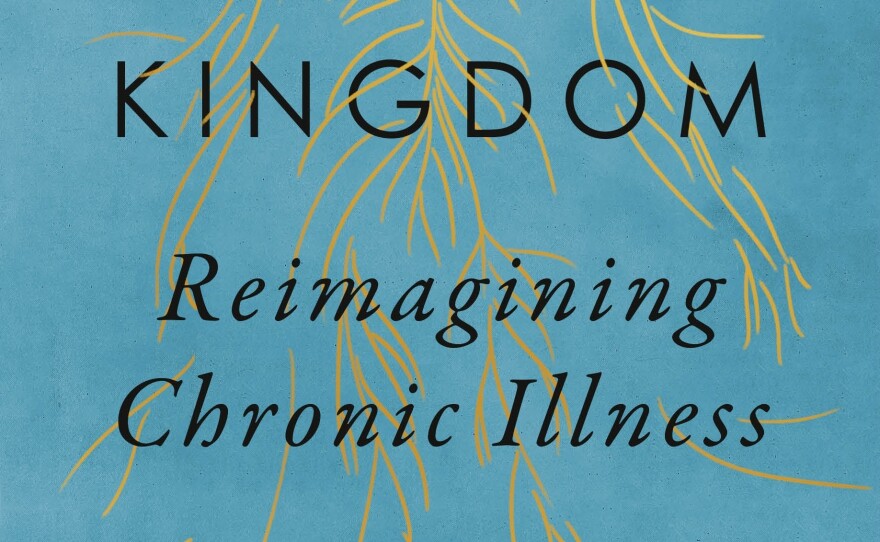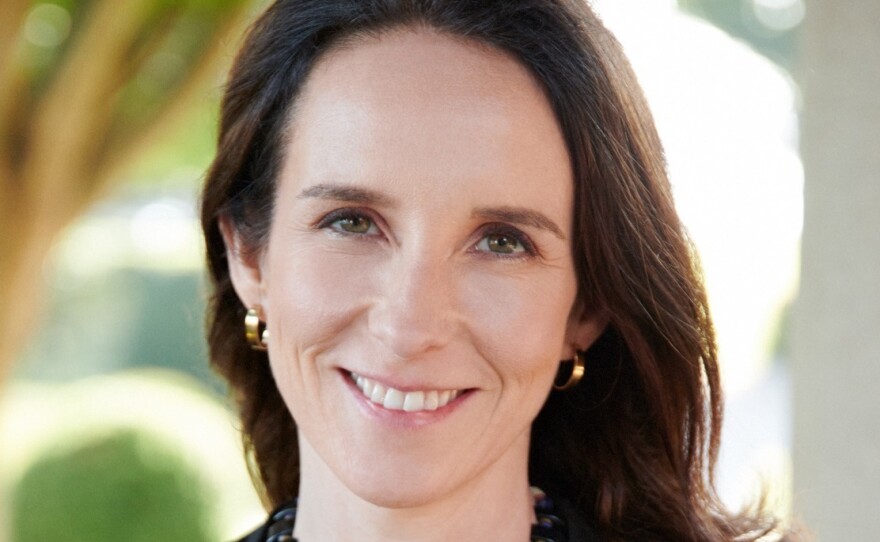The number of new COVID-19 cases is in steep decline in many parts of the U.S., but it's still unknown how many of the people who've had the illness will develop the lingering symptoms of long COVID-19.
Journalist Meghan O'Rourke, who has been writing about long COVID-19 for The Atlantic and Scientific American, says as the coronavirus pandemic was starting to unfold in the U.S., she was dreading "the prospect of a tremendous wave of chronic illness that would follow."
That's because O'Rourke has firsthand experience living with poorly understood chronic conditions. That has made her sensitive to the struggles of patients living with hard-to-diagnose diseases who often have had their symptoms dismissed by a medical system that can't pin them down.
Long COVID-19 can be similarly hard to characterize. The term encompasses "a wide variety of symptoms that persist long after the initial infection with the SARS-CoV-2 virus," O'Rourke says. "Those symptoms might include chest pain, but they also include so-called vague and subjective symptoms like brain fog or fatigue and roaming pain in the body."
The symptoms of long COVID-19 can be difficult to track on conventional lab tests, in part because they may come and go over time. "And all of this puts pressure on patients who then have to testify to the reality of their own illness," O'Rourke says.
O'Rourke writes about her own experience struggling to get a diagnosis in her new book, The Invisible Kingdom: Reimagining Chronic Illness. For O'Rourke, it all started in the late 1990s, soon after graduating from college. Over the years, her symptoms have included extreme fatigue, brain fog, joint pain, nerve pain, hives, fevers and more. She visited a number of specialists, but more often than not, the doctors attributed what she was experiencing to stress or anxiety.
"The hardest part of being ill was that I didn't feel I had any advocate on my side who even believed fully in the reality of what I was describing to them," she says. "When you're at the edge of medical knowledge, the lack of evidence is treated as evidence that the problem is you and your mind. ... I felt, in a sense, kind of locked away in a room like a 19th-century hysteric."
When you're at the edge of medical knowledge, the lack of evidence is treated as evidence that the problem is you and your mind. ... I felt, in a sense, kind of locked away in a room like a 19th-century hysteric.
Eventually, O'Rourke found a team of doctors whom she likens to "detectives at my side." She was diagnosed with autoimmune thyroiditis, a disease in which the body begins attacking the thyroid, as well as with Lyme disease and the genetic condition Ehlers-Danlos syndrome.
For O'Rourke, just getting a diagnosis felt like a triumph. But she acknowledges that many others who suffer from chronic illnesses don't have the same resources to continue seeking treatment.
"It's really clear from research that, in fact, social structures are a major factor in all of this," she says. "I think we're witnessing a calamity that is one not of personal failure, but of societal failure, and one that we really need to reckon with openly."
She spoke with Fresh Air's Terry Gross about her new book, chronic illness and long COVID-19.
Interview highlights

On current theories and research about the cause of long COVID-19 and its impact on chronic diseases
When we get sick, our immune system springs into action, trying to get rid of the pathogens that have entered, or even invaded, our body, and tries to push them out. And so one theory of long COVID has been that in some people, that immune response just doesn't turn off for a wide variety of reasons. And so they keep getting damage to their body done by their own immune system, either an autoimmune process or inflammation.
There's also some evidence suggesting that in some parts of the body, fragments of the virus remain or in other parts that the virus itself remains, persisting and triggering ongoing immune action. ...
One of the great mysteries is: Why do some people get a mild case of acute COVID and then end up unable to walk up and down stairs, almost bedridden, subsumed in brain fog? A recent study found that there are some indicators that can tell us a little bit about who might be prone to get long COVID. One such indicator is the level of coronavirus RNA in your blood early on in the infection.
That tells us something about that term "viral load." If you have a high viral load early in your infection, even if your symptoms are mild, you might end up with long COVID. There's also evidence that some of these things called "autoantibodies," which are the antibodies in autoimmune disease ... that instead of attacking those pathogens that are coming into your body, actually end up mistakenly, mysteriously attacking your own tissue instead. Another factor is people who have reactivated Epstein-Barr virus, which many of us have had, but some of us have these episodes of reactivation that can be a sign that you might develop long COVID, and another is the presence of Type 2 diabetes.
On how her experiences with chronic illness made her aware of long COVID-19 early on in the pandemic
What kept me up at night as the coronavirus pandemic came to the United States was not just the wave of acute infections that were clearly coming, but also the prospect of a tremendous wave of chronic illness that would follow them. The research I had been doing already for five years had taught me that in many cases, infections can leave ongoing problems in a subset of patients in ways that we're just beginning in medical science to really research and understand.
Many autoimmune diseases are triggered by viruses, in fact. It's the interaction of a virus or an infection with your own genetics [that] can, in some cases, trigger conditions like lupus or multiple sclerosis, as we just found out in a big study. So I had been talking to virologists and researchers who work on the ways that Epstein-Barr creates all kinds of lung conditions. And reading these early reports of the severity of the SARS-CoV-2 virus just had me worrying that a tremendous number of people were going to get sick and never get better.
So I was kind of lurking on message boards and reading around from pretty much April of 2020 to see what I was seeing and pretty quickly just started seeing these terrifying messages that reminded me so much of my own case where people were saying, "I just never got better. I got sick. I have brain fog. My energy is gone. I'm not the person I once was." I read those with a chill of recognition.
On connecting the 19th-century diagnosis of "hysteria" to today's autoimmune diseases
A lot of women who ended up diagnosed with hysteria had abdominal pain, bouts of fatigue, symptoms that came and went. So doctors originally were trying to kind of figure out what was wrong with these women, and they thought that it was a disorder of the nervous system, which was newly discovered and something there was a lot of excitement around. And when they couldn't find an answer in their tests, they then ended up abandoning that idea. Doctors start to increasingly talk about the ways that hysteria is caused by women's brains, that women are trying to use their brains too much and so therefore they're sick.
The reason I [say] autoimmune diseases and chronic fatigue syndrome, or myalgic encephalomyelitis, and chronic Lyme disease and fibromyalgia ... are today's "hysteria" is that ... in the research I did, you can see medicine is incredibly uncomfortable with areas of uncertainty, diseases it can't measure, diseases it doesn't have a really clear handle on. And so when ... anyone who has one of these diseases goes into a doctor's office and says, "Doctor, I'm experiencing fatigue. I'm experiencing brain fog. It comes and goes," you very quickly get to the question of whether you're anxious. ...
There's this really fascinating phenomenon in current medical science in which patients who live at the edge of medical knowledge, patients whose diseases we have a tough time measuring or we just don't understand yet ... rather than being told, "Hey, you're probably someone who has something I don't understand," such patients are often told: "I think you should see a psychiatrist. I think you are suffering from anxiety. Maybe you have depression."
I want to be really clear: Advances in how we treat mental illness are one of the great triumphs of 20th-century medicine, and it's really important to talk about mental health and chronic illness. But the problem I kept seeing patients talk to me about — and what happened to me — is that doctors often go to the suspicion of anxiety in a way that forecloses further investigation into what might be going on.
On why she found integrative medicine helpful
The reason I found it so helpful was that they take a whole-body approach. They are medically trained doctors, so they're looking at your labs and they're prescribing medication when appropriate, but they were also talking to me about things like my sleeping habits, the level of stress in my life and food sensitivities and trying to really help me figure out what foods made me feel better and what foods made me feel worse, because a lot of the time when I ate, I just felt really sick afterwards — I got terrible headaches. So they worked with me very patiently to try to manage my illness. ...

I think working with integrative doctors helped me feel that I did have a partner in my health care. I'm a very evidence-based person, so one always has questions about some of the aspects of medicine that are less well studied, like supplements and all of that, but in my case, it just became really clear that what these doctors were doing with me, the kinds of lifestyle changes they were advocating, made a big difference in my day-to-day functioning.
On why she believes chronic illness is representative of this time we're living in
One of the things I found in my reporting was that many people who lived with these illnesses, who lived with autoimmunity, thought that the problem was something in themselves ... that they were living an inauthentic life. They hadn't lived the life they should lead. And in this way, they took their illness and they turned it into a metaphor for personal inauthenticity that only they could overcome, which is a huge burden for an individual to live with. ...
These diseases kind of allow both sick people and people who are healthy to see the problem as an individual problem, [and that] allows us to look away from the social factors that are contributing to the rise of these diseases. So everything from food deserts to lack of chemical regulation to probably our chronically fast-paced lifestyles and lack of social safety nets for new mothers and all sorts of things. I really just came to think that these diseases reveal something to us about our culture in a way that made them deeply representative of aspects of the time that we needed to look more deeply at.
Sam Briger and Joel Wolfram produced and edited this interview for broadcast. Bridget Bentz, Molly Seavy-Nesper and Carmel Wroth adapted it for the web.
Copyright 2022 Fresh Air. To see more, visit Fresh Air. 9(MDAzMjM2NDYzMDEyMzc1Njk5NjAxNzY3OQ001))






